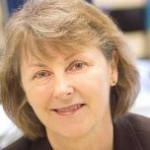 Sue Stanton, Director, Rehabilitation Science Online Programs and Associate Professor. Her interests and expertise is in distance and distributed learning, and the impact of the changing needs of learners for course design and delivery, faculty development and policies and practices in higher education.
Sue Stanton, Director, Rehabilitation Science Online Programs and Associate Professor. Her interests and expertise is in distance and distributed learning, and the impact of the changing needs of learners for course design and delivery, faculty development and policies and practices in higher education.
Examining evidence for its potential translation to practice is not new but uptake in practice continues to be a challenge. As stated in the title of the ‘Physical Therapy’ editorial by Linda Li and Philip van der Wees, quoted from Johann van Goethe, “Knowing is not enough; we must apply. Willing is not enough; we must do” (2015, p. 486). Linking learning for credit to facilitate knowledge translation (KT) can facilitate practice change and bring new career opportunities.
For over 10 years, UBC Master of Rehabilitation Science (MRSc) students have been evaluating evidence and applying it to their work through their course assignments and research projects. Blending educational advancement with skill development for knowledge translation (KT) and application to practice is a hallmark of the MRSc, and confirmed recently in the program evaluation conducted by Dr. Theresa McElroy.
The 7-week RHSC 583, Applying Research to Practice elective courses can be taken up to 4 times for a total of 6 credits. KT content provides the backdrop and the specific topic area, the content for different sections. Unlike other courses MRSc learners’ interests and areas of practice drive decisions about which topics/themes are scheduled – this better ensures electives fit student needs, and increases ‘course run rates’. Since 2006, 18 sections of RHSC 583 have been offered applying research in areas important to practice and students. Among these are practice areas like Orthopaedics and Pain Management, administration topics like Leadership and Program Evaluation, and practice mixed with research approaches such as Single-Subject and Case Study Research. The latter topics grow knowledge and skills for generating as well as translating evidence.
In 2015-16, physical therapists are facilitating 4 of the 5 RHSC 583 courses, Sue Murphy, Dr. Cheryl Beach, Jason Giesbrecht and Tamie Aubin. For more information about these instructors and topics, future RHSC 583 courses and facilitators/instructors please monitor the RHSC 583 webpage above. If you are not already an MRSc student or do not expect to be but wish to receive any new information about graduate level credit courses for non-MRSc learners, please contact info@mrsc.ubc.ca.
Li, L. C., & van der Wees, P. J. (2015, April). “Knowing is not enough; we must apply. Willing is not enough; we must do”. Physical Therapy, 95(4), 486-490.